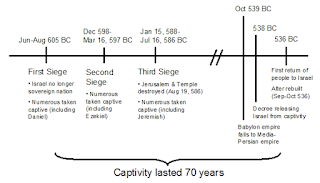Then the nations will know that I am the Lord. Ezekiel 25-32 begins a series of oracles against the foreign nations surrounding Israel. Egypt (ch. 29-32) and Tyre (ch. 26-28) receive the most attention, but this oracle concentrates on Judah's immediate neighbors: Ammon, Moab, Edom and Philistia (ch. 25). They had regarded the downfall of Judah with delight (Ammon) and derision (Moab); they had taken the opportunity to execute revenge on Judah (Edom and Philistia). Ezekiel's oracle warns that retribution will come.
It is easy to condemn these neighbors of Israel for their attitudes to her. Yet these attitudes can be ours too when trouble befalls one of our neighbors. Meanwhile God is the God of the whole earth and is ultimately in control of the fate of nations, as of individuals.
- Against aggression and revenge (25:1-17): Judah's four neighbors.
- Against economic arrogance (26:1-28:19): Tyre and Sidon.
- Against imperial delusions (29:1-32:32): Egypt.
- God and the nations: The message.
The heat of God's anger and the bitterness of his sarcasm targeted at Israel have been heard through Ezekiel (ch. 1-24). In a few months Ezekiel will embark upon a different and positive pastoral message and ministry (ch. 33-48). In the interim, to prepare for this transition, into the gap, is a portfolio of oracles spoken against various nations (ch. 25-32). They were delivered during or shortly after the siege of Jerusalem. So it is reasonably appropriate that they are inserted at this point in the book, in view of the historical context referred to in ch. 24 and 33. They fill the gap between the announcement of the beginning of the siege (Eze 24:2) and the news of its terrible end (Eze 33:21).
There are many similarities in Ezekiel 25-32 and comparable collections of oracles against the foreign nations in Amos 1-2, Isaiah 13-23 and Jeremiah 46-51. Such chapters are remarkably similar to the prophets attacking and condemning Israel. The same forms of speech are used, the same metaphors of courtroom justice, sometimes the same accusations of sins and crimes, the same ringing words of condemnation, the same declarations of coming doom and destruction, and above all, the same ultimate speaker: the Lord (Yahweh), the God of Israel. The prophets took the words and forms and language against Israel's enemies and turned them upon Israel itself--effectively saying that God was now treating Israel as his own enemy. Beginning with Amos (ch.1-2), the other prophets followed his example, using the oracle of woe upon the enemies of God, as their sharpest weapon against Israel itself.
Ammon. They gloated over the destruction of Israel and Judah. They will be plundered by the peoples of the east [nomadic tribes; Rabbah - capital of Ammon] (25:1-5). Because they rejoiced maliciously over Israel, they will be ruined (6-7).
Moab. Because they viewed Judah with contempt, they will be taken over by the people from the east (25:8-11).
Edom. Because they took revenge on Judah, they will suffer devastation at the hands of Israel (25:12-14).
Philistia. Because they took revenge on Judah, the Kerethites and the rest of the coastal peoples will be destroyed (25:15-17).




